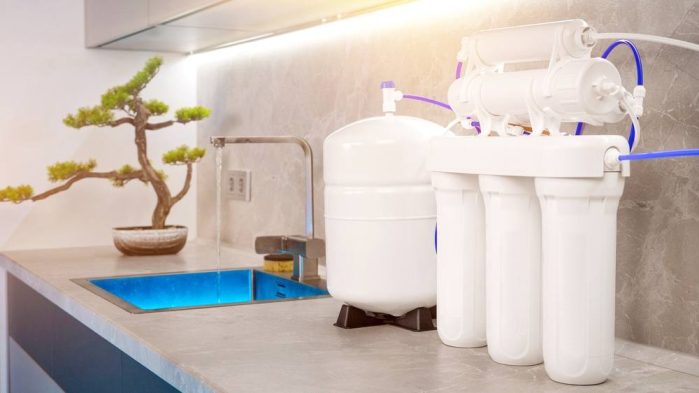
Purifying water to make it safe for drinking and other uses is just as important as finding that water in the first place when it comes to prepping for natural disasters or long-term emergencies. Without potable water, you and your family can’t survive for long regardless of how well stocked your emergency food supply is. If you aren’t fortunate enough to live somewhere with clean, fresh drinking water year-round, you may find yourself needing a water purifier sooner rather than later. But are they effective? Do they work or are they just another piece of useless survival gear? Today we’ll take a look at how effective different types of water purifiers are and what factors you should consider before buying one.
Types of Water Purifiers
Countertop water purifiers: Countertop water purifiers are usually compact appliances that you can keep on your kitchen counter. These purifiers use carbon filters to remove contaminants from your water. They are best for people who need to purify a small amount of water.
Pitcher water filters: These are a great choice for people who don’t have access to municipal water. They also make an excellent option for people who need to purify a small amount of water.
Whole house water filters: If a small water purifier isn’t enough for your household, you can opt for a whole house water filter. These large filters are installed on your water supply line, making the entire volume of water in your household safe to drink.
Sink water filters: These are installed on your faucet, making them ideal for people who don’t have access to municipal water. They are also useful for households that need to purify a small amount of water.
Faucet water filters: Faucet water filters are installed on your sink faucet. They use replaceable cartridges to remove harmful contaminants from your water.
UV water purifiers: UV water purifiers use UV lights to eliminate harmful microorganisms from your water.
How well do Water Purifiers Work?
Purifiers do their job very well in most cases, but you shouldn’t expect them to do the job of a full-on water treatment system. Water purifiers are designed to remove pathogens from water by either filtering them out or killing them with ultraviolet light, ionization, or reverse osmosis. If you have a water treatment system, you can remove harmful chemicals and other contaminants from your water as well as pathogens. Water treatment systems also provide better taste and smell than water purifiers. The difference between the two is much like the difference between catching rainwater with a rain barrel and having a cistern installed.
Ultraviolet Light Water Purifiers
Ultraviolet light purifiers are inexpensive, compact units that are great for small groups. They’re easy to use and can be set up in no time at all. Just add water and turn on the switch. Some ultraviolet light water purifiers can treat as much as 25 gallons of water per minute. That’s enough for about four to five people. These purifiers work by beaming ultraviolet light through the water you’re trying to purify. Viruses, bacteria, and other pathogens are killed in the process. Ultraviolet purifiers can’t remove any chemicals or bad taste from your water, but they do improve the taste and smell. They’re also effective at treating water that is murky or cloudy. However, they aren’t effective with very large particles, like sand. Finally, ultraviolet purifiers aren’t effective against certain types of bacteria, like E. coli.
Ionization Water Purifiers
Ionization water purifiers are great at removing certain types of chemicals from your water. They aren’t so great at removing pathogens. Ionization water purifiers use negative ions to attract positively charged impurities in your water as it passes through the purifier. The amount of negative ions in the purifier determines how many types of impurities it can remove from your water. Some ionization purifiers are effective against heavy metals (like lead and copper), pesticides, and other industrial chemicals. Some purifiers are designed to remove impurities from your water as it goes in, while others are designed to remove impurities from your water as it leaves the purifier. Ionization purifiers are more likely to remove impurities from your water as it goes in.
Reverse Osmosis Water Purifiers
Reverse osmosis water purifiers are great for removing a lot of different types of contaminants from your water. They are not so great at removing pathogens. Reverse osmosis water purifiers work by forcing water through a semi-permeable membrane with a high-pressure pump. Some purifiers will also add a chemical that kills pathogens as the water goes through the membrane. Other types of reverse osmosis water purifiers add minerals to your water to improve its taste. This is helpful if you’re purifying water from a river that is clean but tastes bad. Some purifiers can clean and purify as much as 1,000 gallons of water per day. That’s enough for an entire family or a small group.
What To Look For When Buying a Water Purifier
There are a few factors you should keep in mind when comparing purifiers. These factors will help you determine which purifiers are more effective at removing a specific type of contaminant from your water.
Flow rate: The amount of water the purifier can clean in a minute.
Effluent flow rate: The amount of water the purifier pushes through the clean water outlet per minute.
Batch size: How much water the purifier can treat at one time.
Cost/benefit ratio: The cost of the purifier compared to what it removes from your water.
Safe water from Lipsey
Clean and safe drinking water is an important part of everyday life. Fortunately, here at Lipsey, we deliver the purest, cleanest, and best-tasting water to families and businesses in the metro Atlanta area. Lipsey is dedicated to bringing the healthiest and freshest water straight from the beautiful Blue Ridge Mountains.
